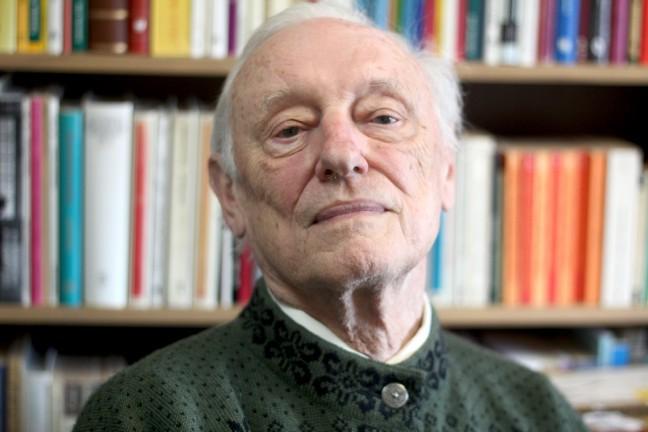A childhood fear was that Adolf Hitler would ask him to play a trumpet solo. For five years life became a lesson in survival and was consumed by order, song and seasonal uniforms.
In 1940, University of Wisconsin German professor, blond and blue-eyed Jost Hermand, was 10 years old. Living under the Third Reich, he was required to join the Hitler Youth Camps, where he would spend the majority of the next five years.
“As Hitler came out, the blond ones standing in the first row and the dark ones standing in the second row … I would always have to stand in the front row with my trumpet,” Hermand said. “And as Hitler would shake the hands, he would shake my hand but I was only afraid of this. I had no other political reactions, I was only afraid Hitler would say ‘step forward’ and I would do a solo, that was the only fear I had.”
Hermand roomed with 22 boys, under what he called a state of “Social Darwinism,” where the strongest were encouraged to dominate the weak. They had no electricity, no running water and no books.
Recalling Hitler’s interpretation of the camps, Hermand explained the youths were meant to be a “pack of young wolves where the few that are the leaders dominate the others.”
Of the 22, Hermand was number 18.
“It was very rough,” he said. “It was a lot of beating each other up. We were too young for political indoctrination, if you are 10 or 11 and so forth. I was kind of a weak boy and I hated it.”
There was no race theory and no discussion of political ideology, Hermand said, adding the leaders, who were not the “brightest,” focused on “sports, sports, sports and always singing, singing, singing.”
Hermand, a self-proclaimed “mama’s boy,” never had an affinity for sports. He was interested in history. Formal education, however, was minimally emphasized.
“We had very little other school instruction, only in the morning for two or three hours,” Hermand said. “It was a camp without electricity, without running water, without books. As a high school student we had no books for three years. We just had sheets of paper and a pencil.”
The teachers were brought back from retirement, they were in their 70s and no longer had an interest in teaching, he added.
Despite pleading with his “strictly anti-fascist” mother, Hermand was forced to stay in the youth camps until the end of the war in 1945. Although required to sing politically-charged Hitler Youth songs on a daily basis, Hermand said his younger self never reflected on the relayed messages and left the camp without being ideologically influenced.
However, looking back, the five years left a different impact.
“I entered the camp as a very weak boy, as a mama’s boy basically,” Hermand said. “But in the end, I learned how to survive. The camp strengthened me a lot. I had to survive, being one of the underlings, being number 18. I think I came out much stronger than I entered it. That is the strange dialectics of experiences like this.”
Having been denied an education in the camps, Hermand was motivated to pursue a career in academics. Struck with good fortune, he was not drafted into the final battle against the Red Army, a battle that killed many of his friends, and attended high school and university, where he received a PhD after only eight semesters of study.
Fascism, and the war, however, was never discussed, neither at home or in school. Ex-Nazi professors were never questioned, German history classes would stop short at the end of the 19th century and “existential problems” of hunger and unemployment consumed home discussions.
“Professors didn’t come back from exile,” Hermand said. “The young ones were all killed at war and the former Nazis stayed on … They were not Nazis any longer, they were disappointed. Of course, they didn’t want to talk about it. There was no coming to terms in the 1950s with the past of Germany, and fascism was not the leading the ideology.”
Such widespread silence on the issue, and on the youth camps, paired with a growing neo-fascist movement after the German unification in 1989, inspired Hermand to write a book about his experiences and relocate his research to the University of Wisconsin in 1958.
Today Hermand has taught at UW for 55 years, sharing his stories, writing and researching. He is 83 years old.
“Why I am interested in teaching is because, first of all, I am embarrassed as a German,” Hermand said. “I am embarrassed that the overwhelming majority of Germans allowed the Nazi doctrine. There was so little resistance. There was no rebellion. Until the last day of the war, the soldiers and the workers supported World War Two. And that is an embarrassing fact for me.”








